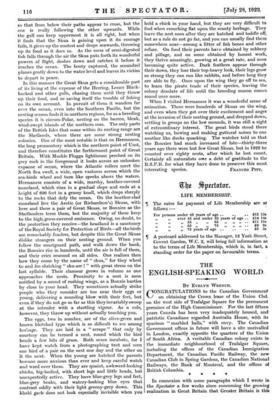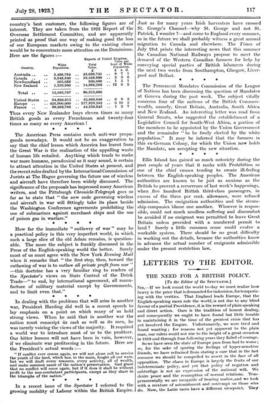THE
ENGLISH-SPEAKING WORLD.
BY EVELYN WRENCH.
CONGRATULATIONS to the Canadian Government on obtaining the Crown lease of the Union Clul, on the west side of Trafalgar Square for the permanent premises of the High Commissioner. For the last fifteen years Canada has been very inadequately housed, and patriotic Canadians regarded Australia House, with its spacious " marbled halls," with envy. The Canadian Government offices in future will have a site unrivalled in London, exactly opposite the quarters of the Union of South Africa. A veritable Canadian colony exists in the immediate neighbourhood of Trafalgar Square, including the offices of the Canadian Immigration • Department, the Canadian Pacific Railway, the new Canadian Club in Spring Gardens, the Canadian National Railways, the Bank of Montreal, and the offices of British Columbia.
In connexion with some paragraphs which I wrote in the Spectator a few weeks since concerning the growing realization in Great Britain that Greater Britain is this Exports of United Kingdom.
Value per Total head of White Value. Population.
s. d. 7 1 3 6 5 1 0 2 9 3 10 2 2 7
Thus every New Zealander buys eleven times as many British goods as every Frenchman and twenty-four times as many as every American * * * * The American Press contains much anti-war propa- ganda nowadays. It would not be an exaggeration to say that the chief lesson which America has learnt from the Great War is the realization of the appalling waste of human life entailed. Anything which tends to make war more humane, paradoxical as it may sound, is certain to attract attention in the United States at present, and the recent rules drafted by the International Commission of Jurists at The Hague governing the future use of wireless and aircraft have therefore been widely discussed. The significance of the proposals has impressed many American writers, and the Pittsburgh Chionicle-Telegraph goes so far as to state that " the new code governing wireless and aircraft in war will fittingly take its place beside the Washington Conference agreements prohibiting the use of submarines against merchant ships and the use of poison gas in warfare." * * * How far the immediate " outlawry of war " may be a practical policy in this very imperfect world, in which such a large slice of the old Adam remains, is question- able. The more the subject is frankly discussed in the Press of the English-speaking world the better. Surely most of us must agree with the New York Evening Mail when it remarks that " the first step, then, toward the outlawing of war is to outlaw all private profit from war " —this doctrine has a very familiar ring to readers of the Spectator's views on State Control of the Drink Trade—" to end, by international agreement, all manu- facture of military material except by Governments, and to limit even that."
* * * * In dealing with the problems that will arise in another war, President Harding did well in a recent speech to lay emphasis on a point on which many of us hold strong views. When he said that in another war the nation must conscript its cash as well as its men, he was merely voicing the views of the majority. It required a world war to introduce most of us to the profiteer. Our bitter lessons will not have been in vain, however, if we eliminate war profiteering in the future. Here are the President's actual words :- " If conflict ever comes again, we will not alone call to service the youth of the land, which has, in the main, fought all our wars, but we will draft every resource, every activity, all of wealth, and make common cause of the nation's preservation. God grant that no conflict will come again, but if it does it shall be without profit to the non-combatant participants, except as they share in the triumphs of the nation." * * * * In a recent issue of the Spectator I referred to the growing mobility of Labour within the British Empire. country's best customer, the following figures are of interest. They are taken from the 1922 Report of the Overseas Settlement Committee, and are apparently printed as proof that one way of making good the loss of our European markets owing to the existing chaos would be to concentrate more attention on the Dominions. Here are the figures :—
Country,
White Population.
Australia .. 5,486,794 Canada .. 8,948,340 Newfoundland 263,688 New Zealand 1,239,980 Total .. .. 15,883,797 United States .. 94,820,915 Europe .. .. 426,900,000 France .. 89,209,766 £ £ .. 45,636,741 .. 8 .. 19,458,990 .. 2 .. 830,060 .. 1 .. 14,889,289 .. 12 80,315,680
.. 43,988,648 .. 0 .. 217,828,242 .. 0 .. 44,259,945 .. 1
Just as for many years Irish harvesters have crossed St. George's Channel---:why St. George and not St. Patrick, I wonder ?—and come to England every summer, so in the future we shall probably witness a great annual migration to Canada and elsewhere. The Times of July 21st prints the interesting news that this summer the Canadian National Railways propose to meet the demand of the Western Canadian farmers • for help by conveying special parties of British labourers during the next two weeks from Southampton, Glasgow, Liver- pool and Belfast.
* * The Permanent Mandates Commission of the League of Nations has been discussing the question of Mandates at Geneva during the past week. The subject vitally concerns four of the nations of the British Common- wealth, namely, Great Britain, Australia, South Africa and New Zealand. An interesting letter was read from General Smuts, who suggested the establishment of a Legislative Council for South-West Africa, a portion of the members to be appointed by the Union Government and the remainder " to be freely elected by the white population." It may be inferred that the farmers in this ex-German Colony, for which the Union now holds the Mandate, are accepting the new situation.
* * * Ellis Island has gained so much notoriety during the past couple of years that it ranks with Prohibition as one of the chief causes tending to create ill-feeling between the English-speaking peoples. The American authorities are known to be just as anxious as the British to prevent a recurrence of lust week's happenings, when .five hundred British third-class passengers, in excess of the three per cent. allowance, were refused admission. The emigration authorities and the steam- ship companies blame one another. Whoever is respon- sible, could not much needless suffering and discomfort be avoided if no emigrant was permitted to leave Great Britain unless provided with a numbered permit to land ? Surely a little common sense could evolve a workable system. There should be no great difficulty in working out the details, because the authorities know in advance the actual number of emigrants admissible under the present restriction law.







































 Previous page
Previous page